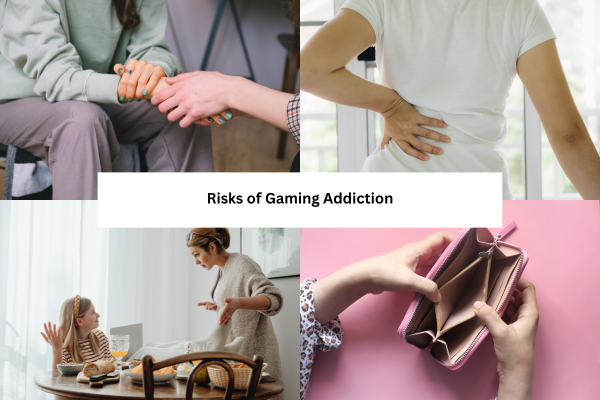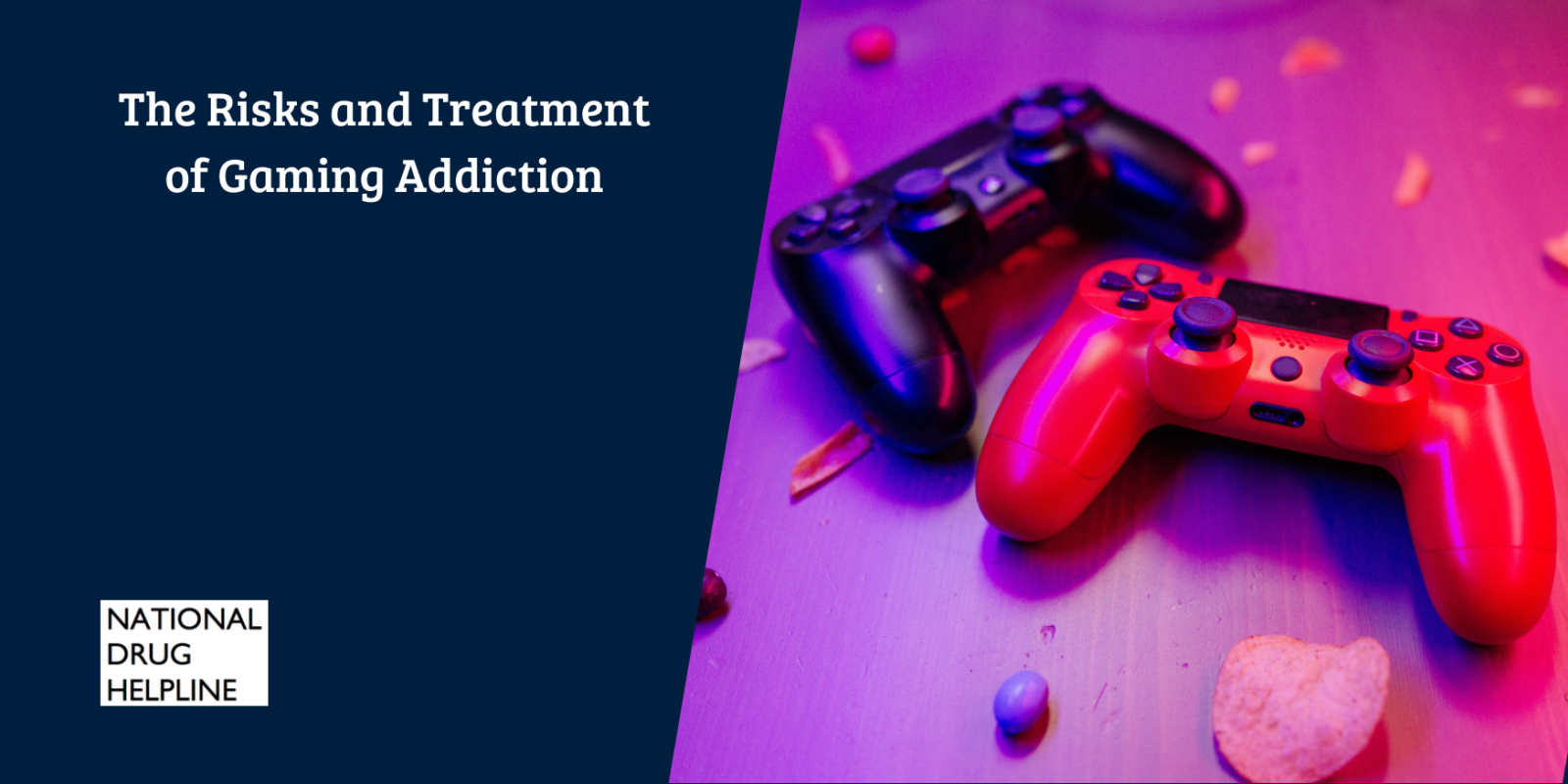In people of all age groups, gaming has become a popular pastime. This is because gaming offers entertainment, can be a substitute for social connection, and also allows cognitive engagement. However, some people may develop a serious behavioral problem known as gaming addiction.
Gaming addiction is officially recognized by the World Health Organization as “Gaming Disorder,”. [1] This condition is characterized by impairment in the ability to take control over gaming, prioritization of gaming over everything else, and continuing to be involved in gaming despite of its negative consequences.
Video gaming addiction not only affects children or adolescents, but it can also be seen in adults. The inability to stop gaming can lead to emotional, social, and physical challenges. [2] Although playing video games in moderation can be a fun way to pass time, gaming excessively may eventually interfere with daily life, relationships, and mental health.
Signs and Symptoms of Gaming Addiction
The signs of gaming addiction can be very similar to addiction to other substances or behaviors. Only by recognizing these signs early on can one take the first step toward intervention. Common indicators of gaming addiction include:
- Preoccupation with gaming: People with this condition may find themselves constantly thinking about games even when not playing.
- Loss of control: They are unable to cut down or stop gaming despite of repeated attempts to do so.
- Neglecting responsibilities: Gradually, they begin to ignore school, work, or other personal obligations.
- Withdrawal symptoms: If gaming addicts try to stop, they may develop symptoms of withdrawal such as irritability, anxiety, or sadness when they are unable to play.
- Social isolation: In favor of gaming, addicts of gaming may even begin to isolate themselves and avoid friends or family.
- Sleep and health problems: With prolonged untreated gaming addiction, sleep and health issues such as poor sleep, eye strain, headaches, and decreased physical activity begin to arise.
Many parents begin to notice significant changes in a child’s behavior. Some noticeable changes are a decline in academic performance or withdrawal from social activities. Adults with gaming addiction may also experience similar consequences, which are further compounded by work-related or financial stress.
Risks of Gaming Addiction
The risks associated with excessive gaming go far beyond spending too much time in front of a screen or wasting time. Gaming addiction can have profound effects on mental, physical, social, and financial health that can have lasting effects on the person’s life if left unaddressed.

Mental Health Challenges
Excessive gaming has been strongly linked with mental health issues. People addicted to gaming may experience a sense of heightened anxiety, depression, or mood swings. [3] This happens as gaming becomes a primary mechanism to cope with and avoid stressors in real life.
Over time, relying heavily on gaming as a way to escape can impair the ability to make decisions, reduce the level of patience, and weaken the regulation of emotions. For young adults and teenagers, prolonged gaming may even interfere with the formation of identity and social as well as emotional development. Similar issues may also be seen in adults, such as increased irritability, social withdrawal, or decreased problem-solving abilities.
Physical Health Consequences
Gaming can also have a physical toll, but it is often overlooked. Living a sedentary lifestyle for extended periods of time also increases the risk of obesity, cardiovascular problems, and metabolic issues. Gaming addicts are also known to develop musculoskeletal problems secondary to poor posture, such as neck and back pain, as well as repetitive strain injuries (RSIs) in the hands and wrists from prolonged controller or keyboard use. [4]
Another common and concerning consequence of gaming addiction is sleep disruption. Gaming until late hours of the night or exposure to blue light from screens may interfere with the circadian rhythm. This leads to poor quality of sleep, fatigue, and decreased cognitive performance.
Social and Academic/Work Impacts
Gaming addiction can disrupt not just social relationships but also have a serious negative impact on professional or academic responsibilities. People who have severe gaming addictions may withdraw from family and friends. This may lead to strained or broken relationships, including divorce. In children and adolescents, excessive gaming can cause a decline in academic performance and increase school absenteeism. For adults, addiction reduces productivity at work and may even lead to unemployment if gaming interferes with obligations at the workplace.
Financial Risks
Like other types of addiction, gaming addicts may also have to face financial consequences. Apart from the risk of being laid off from work, there are fees involved in gaming, such as in-app purchases or subscription fees that can accumulate rapidly. People with gaming addiction also tend to overspend on gaming equipment, which they sometimes do at the expense of essential expenses such as bills, rent, or groceries.
Gaming Addiction Treatment: How to Stop Gaming Addiction?
Gaming addiction is managed with a combination of behavioral interventions, counseling, and lifestyle modifications. Intervening early on can improve outcomes, particularly in adolescents and younger adults.
Behavioral Therapy
- Cognitive Behavioral Therapy (CBT) can help people recognize harmful gaming habits and develop healthier coping mechanisms.
- Motivational interviewing encourages people to explore their ambivalence toward change and strengthen motivation to reduce gaming.
Family and Social Support
- Family therapy can help address the family dynamics that may contribute to addiction, foster communication, and set healthy boundaries.
- Peer support groups through programs such as Gaming Addicts Anonymous can provide community support and accountability.
Lifestyle Modifications
- Structured daily routine, such as setting fixed times for gaming, work, study, exercise, and social activities.
- Alternative activities like hobbies, sports, and social engagement outside of gaming.
- Screen time management tools, including usage of apps or parental controls to limit playtime.
Professional and Medical Support
In severe cases, a mental health professional may be required, who may recommend:
- Medication to treat underlying conditions like anxiety, depression, or ADHD.
- Residential or outpatient programs that provide a structured environment and intensive support for those unable to control gaming at home.
The Takeaway
Gaming addiction affects both young people and adults and can impact mental health, physical well-being, relationships, and daily functioning if it is not treated. However, by recognizing it early on, recovery is achievable with a structured gaming addiction treatment and a strong support system. Through therapy, lifestyle modifications, or peer support, gaming addiction can be properly managed to help people affected with this condition regain balance and lead fulfilling lives.
References
| ↑1 | World Health Organization. (2020, October 22). Addictive behaviours: Gaming disorder. |
|---|---|
| ↑2 | Limone, Pierpaolo, Benedetta Ragni, and Giusi Antonia Toto. “The epidemiology and effects of video game addiction: A systematic review and meta-analysis.” Acta psychologica 241 (2023): 104047. |
| ↑3 | Kowal M, Conroy E, Ramsbottom N, Smithies T, Toth A, Campbell M. Gaming Your Mental Health: A Narrative Review on Mitigating Symptoms of Depression and Anxiety Using Commercial Video Games. JMIR Serious Games. 2021 Jun 16;9(2):e26575. |
| ↑4 | Tholl, C., Bickmann, P., Wechsler, K. et al. Musculoskeletal disorders in video gamers – a systematic review. BMC Musculoskelet Disord 23, 678 (2022). |

